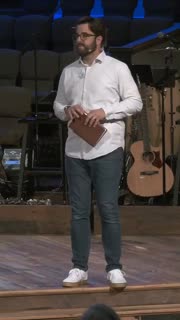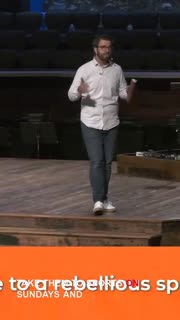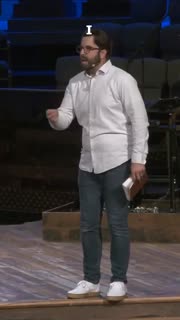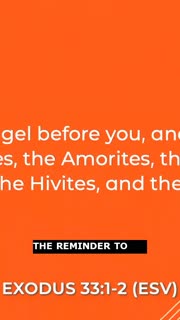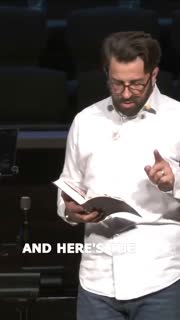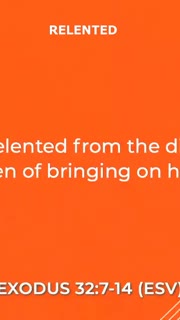Trusting God: Lessons from Israel's Golden Calf Rebellion
Devotional
Sermon Summary
Bible Study Guide
Sermon Clips
### Quotes for Outreach
1. "We are all susceptible to a rebellious spirit. We are. We are all susceptible to a rebellious spirit. It's the original sin, right? Did God say? Did he really say that you can't eat of this? I guess he did. But look at it. It's a beautiful fruit. That rebellious spirit, it's so true. And the truth is... That rebellious spirit can make us act all kinds of ways that we really don't want or think is right. But boy, we do it." [14:21] (39 seconds)
2. "You can take them to sports on Sundays and Wednesdays all you want. There is a 0.0267 chance that they are going to go professional, but there's a 100% chance they are going to spend eternity somewhere. But we do that. I mean, we even... You know, as adults, we love our sports teams, we love our cars, we love our jobs, we love our spouses. All of those can be... Idols in our life." [16:06] (32 seconds)
3. "When I walk out of the ballot box, I walk out and submit to the King of Kings and the Lord of Lords. Because the kingdoms of this world are becoming and will become and have become the kingdoms of our Lord and of His Christ. And He shall reign forever and ever and ever and ever." [20:13] (19 seconds)
4. "The reminder to us, Bethesda is when you feel like you might be in a wilderness, remember that God is taking you somewhere. He is taking you somewhere. We're not just getting out of Egypt. Egypt's not just getting out of us. We are going somewhere. Is anybody glad that we're going somewhere?" [42:44] (22 seconds)
### Quotes for Members
1. "But I would say that in this particular instance, that the making of the golden calf was not the first act of rebellion or idolatry. But rather that making Moses more than he should have been was their first act of rebellion and idolatry. See, Moses had been making these short jaunts up into the mountain, coming down. You know, earlier they even said, hey, you go speak to the Lord for us. We're scared. We're going to kind of stand back here. You go talk to the Lord. And then come and let us know what he says." [05:43] (35 seconds)
2. "And I would submit to you that is the most dangerous form of idolatry. And thank God it ended there, right? Never happened again. Or did it? Or have we today done the exact same thing by elevating political candidates and political platforms and political ideas? And political parties? You're not going to get with me on this one. I know it's not going to get a clap. And I know it's going to go over... It makes about 75%. No, no. I know it's going to make you mad." [19:05] (29 seconds)
3. "And here's the reality. God will not share his place of power and authority. He won't do it. Look at this. This is Isaiah, Isaiah 43, Isaiah 42, 8. I am the Lord. That is my name. My glory I give to no other, nor my praise, to carved idols. Psalm 83 says this, 17. Let them be put to shame and dismayed forever. Let them perish in disgrace, that they may know that you alone, whose name is the Lord, are the most high over all the earth." [22:01] (44 seconds)
4. "And I think it would be fair to say that getting down on our hands and knees and saying Lord take this I'm giving this all to you could be an important thing so there's rebellion there's the reality that God won't share his position of power and authority there are repercussions knowing idolatry is costly but then and I've put two r's together because of time there's a there's a response and then there's repentance so listen to this prayer and confession touches the heart." [32:26] (39 seconds)
5. "And the Lord relented from the disaster that he had spoken of bringing on his people. God heard Moses and he relented. I sought the Lord and he heard and he answered. I sought the Lord and he heard and he answered. I sought the Lord and he heard and he answered. That's why I trust him. That's why I trust him. See, Moses appeals and he hears. There's a response from Moses and then there's a response from God." [37:24] (40 seconds)
Ask a question about this sermon
1. "We are all susceptible to a rebellious spirit. We are. We are all susceptible to a rebellious spirit. It's the original sin, right? Did God say? Did he really say that you can't eat of this? I guess he did. But look at it. It's a beautiful fruit. That rebellious spirit, it's so true. And the truth is... That rebellious spirit can make us act all kinds of ways that we really don't want or think is right. But boy, we do it." [14:21] (39 seconds)
2. "You can take them to sports on Sundays and Wednesdays all you want. There is a 0.0267 chance that they are going to go professional, but there's a 100% chance they are going to spend eternity somewhere. But we do that. I mean, we even... You know, as adults, we love our sports teams, we love our cars, we love our jobs, we love our spouses. All of those can be... Idols in our life." [16:06] (32 seconds)
3. "When I walk out of the ballot box, I walk out and submit to the King of Kings and the Lord of Lords. Because the kingdoms of this world are becoming and will become and have become the kingdoms of our Lord and of His Christ. And He shall reign forever and ever and ever and ever." [20:13] (19 seconds)
4. "The reminder to us, Bethesda is when you feel like you might be in a wilderness, remember that God is taking you somewhere. He is taking you somewhere. We're not just getting out of Egypt. Egypt's not just getting out of us. We are going somewhere. Is anybody glad that we're going somewhere?" [42:44] (22 seconds)
### Quotes for Members
1. "But I would say that in this particular instance, that the making of the golden calf was not the first act of rebellion or idolatry. But rather that making Moses more than he should have been was their first act of rebellion and idolatry. See, Moses had been making these short jaunts up into the mountain, coming down. You know, earlier they even said, hey, you go speak to the Lord for us. We're scared. We're going to kind of stand back here. You go talk to the Lord. And then come and let us know what he says." [05:43] (35 seconds)
2. "And I would submit to you that is the most dangerous form of idolatry. And thank God it ended there, right? Never happened again. Or did it? Or have we today done the exact same thing by elevating political candidates and political platforms and political ideas? And political parties? You're not going to get with me on this one. I know it's not going to get a clap. And I know it's going to go over... It makes about 75%. No, no. I know it's going to make you mad." [19:05] (29 seconds)
3. "And here's the reality. God will not share his place of power and authority. He won't do it. Look at this. This is Isaiah, Isaiah 43, Isaiah 42, 8. I am the Lord. That is my name. My glory I give to no other, nor my praise, to carved idols. Psalm 83 says this, 17. Let them be put to shame and dismayed forever. Let them perish in disgrace, that they may know that you alone, whose name is the Lord, are the most high over all the earth." [22:01] (44 seconds)
4. "And I think it would be fair to say that getting down on our hands and knees and saying Lord take this I'm giving this all to you could be an important thing so there's rebellion there's the reality that God won't share his position of power and authority there are repercussions knowing idolatry is costly but then and I've put two r's together because of time there's a there's a response and then there's repentance so listen to this prayer and confession touches the heart." [32:26] (39 seconds)
5. "And the Lord relented from the disaster that he had spoken of bringing on his people. God heard Moses and he relented. I sought the Lord and he heard and he answered. I sought the Lord and he heard and he answered. I sought the Lord and he heard and he answered. That's why I trust him. That's why I trust him. See, Moses appeals and he hears. There's a response from Moses and then there's a response from God." [37:24] (40 seconds)
